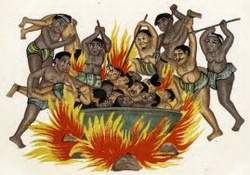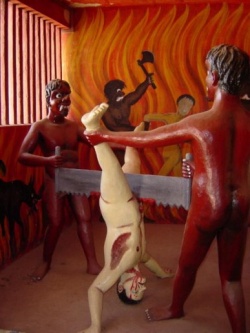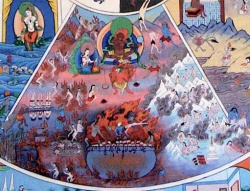Difference between revisions of "Naraka"
(Created page with "thumb|250px| <poem> Naraka (Sanskrit: नरक) is the Sanskrit word for the underworld; literally, of man. According to some schools of Hinduism, Sikh...") |
|||
| (6 intermediate revisions by 3 users not shown) | |||
| Line 1: | Line 1: | ||
[[File:458es.jpg|thumb|250px|]] | [[File:458es.jpg|thumb|250px|]] | ||
| − | + | [[Naraka]] ([[Sanskrit]]: [[नरक]]) is the [[Sanskrit]] [[word]] for the {{Wiki|underworld}}; literally, of man. According to some schools of [[Hinduism]], {{Wiki|Sikhism}}, [[Jainism]] and [[Buddhism]], [[Naraka]] is a place of torment, or [[Hell]]. The [[word]] '[[Neraka]]' (modification of [[Naraka]]) in {{Wiki|Indonesia}} and Malaysian has also been used to describe the {{Wiki|Islamic}} {{Wiki|concept}} of [[Hell]]. | |
| − | |||
| − | Hinduism | + | ==[[Hinduism]]== |
| − | |||
| − | |||
| − | + | A large central panel portrays [[Yama]] the [[God]] of [[Death]] (often referred to as [[Dharma]]) seated on a [[throne]]; to the left stands a [[demon]]. To the right of [[Yama]] sits {{Wiki|Chitragupta}}, assigned with keeping detailed records of every [[human being]] and upon their [[Death]] deciding how they are to be [[reincarnated]], depending on their previous [[actions]]. | |
| − | + | [[Naraka]] in [[Vedas]], is a place where [[souls]] are sent for the expiation of their [[sins]]. It is mentioned especially in [[Dharma]][[śāstras]], [[itihāsas]] and [[Purāṇas]] but also in {{Wiki|Vedic}} [[samhitas]], [[Aranyakas]] and {{Wiki|Upaniṣads}}. Some {{Wiki|Upanisads}} speak of 'darkness' instead of [[hell]]. A summary of {{Wiki|Upaniṣads}}, {{Wiki|Bhagavad Gita}}, mentions [[hell]] several times. Even Adi Sankara mentions it in his commentary on [[Vedanta]] [[Sutra]]. Still, some [[people]] like members of [[Arya]] Samaj don't accept the [[existence]] of [[Naraka]] or consider it {{Wiki|metaphorical}}. | |
| − | Yama, Lord of Justice, puts living beings after | + | In {{Wiki|Puranas}} like {{Wiki|Bhagavata Purana}}, {{Wiki|Garuda Purana}} and {{Wiki|Vishnu Purana}} there are elaborate descriptions of many [[hells]]. They are situated above [[Garbhodaka]] ocean. |
| + | |||
| + | [[Yama]], [[Lord]] of Justice, puts [[living beings]] after [[Death]] for appropriate {{Wiki|punishment}}, for example, in boiling oil. Even [[Mukti-yogyas]] ([[souls]] eligible for [[mukti]] or [[moksha]], [[liberation]]), and [[Nitya-samsarins]] (forever transmigrating ones in {{Wiki|Dvaita}} {{Wiki|theology}}) can [[experience]] [[Naraka]] for expiation. After the period of {{Wiki|punishment}} is complete, they are [[reborn]] on [[earth]] in [[human]] or [[animal]] [[bodies]]. ] Therefore neither [[naraka]] nor [[svarga]] are [[permanent]] [[abodes]]. | ||
[[File:Buddhist_hell_2.jpg|thumb|250px|]] | [[File:Buddhist_hell_2.jpg|thumb|250px|]] | ||
| − | Yama Loka is the abode of Lord Yama. Yama is Dharmaraja or God of justice; Yama Loka is a temporary purgatorium for sinners or papis. According to Hindu scriptures, Yama's divine assistant Lord Chitragupta maintains a record of the individual deeds of every living being in the world, and based on the complete audit of his deeds, dispatches the soul of the deceased either to Svarga (Heaven) or to the various Narakas according to the nature of their sins. The scriptures describe that even people who have done a majority of good deeds could come to Yama Loka for redemption from the small sins they have committed, and once the punishments have been served for those sins they could be sent for | + | [[Yama]] [[Loka]] is the [[abode]] of [[Lord]] [[Yama]]. [[Yama]] is [[Dharmaraja]] or [[God]] of justice; [[Yama]] [[Loka]] is a temporary purgatorium for sinners or papis. According to {{Wiki|Hindu scriptures}}, [[Yama's]] [[divine]] assistant [[Lord]] {{Wiki|Chitragupta}} maintains a record of the {{Wiki|individual}} [[deeds]] of every [[living being]] in the [[world]], and based on the complete audit of his [[deeds]], dispatches the [[soul]] of the deceased either to [[Svarga]] ([[Heaven]]) or to the various [[Narakas]] according to the [[nature]] of their [[sins]]. The [[scriptures]] describe that even [[people]] who have done a majority of [[good deeds]] could come to [[Yama]] [[Loka]] for redemption from the small [[sins]] they have committed, and once the punishments have been served for those [[sins]] they could be sent for [[Rebirth]] or to [[Heaven]]. In the epic of {{Wiki|Mahabharata}}, even the {{Wiki|Pandavas}} (who represent [[righteousness]] and virtuousness) spent a brief [[time]] in [[hell]] for their small [[sins]]. |
| − | At the time of | + | At the [[time]] of [[Death]], sinful [[souls]] are vulnerable for capture by [[Yamadutas]], servants of [[Yama]] (who comes personally only in special cases). [[Yama]] ordered his servants to leave [[Vaishnavas]] alone. Sri [[Vaishnavas]] are taken by [[Vishnudutas]] to [[Vaikuntha]] and [[Gaudiya]] [[Vaishnavas]] to [[Goloka]]. |
| − | |||
| − | |||
| − | |||
| − | In Buddhism, Naraka refers to the worlds of greatest | + | ==[[Buddhism]]== |
| − | Jainism | + | |
| + | A mural from a [[temple]] in northern [[Thailand]]. The unclothed [[spirits]] of the [[dead]] are brought before [[Yama]] for [[Judgement]]. In the background, Mālaya (พระมาลัย) watches from above as sinners are fried in a large oil cauldron. | ||
| + | |||
| + | In [[Buddhism]], [[Naraka]] refers to the [[worlds]] of greatest [[Suffering]]. [[Buddhist texts]] describe a vast array of tortures and [[realms]] of torment in [[Naraka]]; an example is the [[Devadūta]]-[[Sutta]] from the [[Pāli Canon]]. The descriptions vary from text to text and are not always consistent with each other. Though the term is often translated as "[[hell]]", unlike the {{Wiki|Abrahamic}} [[hells]] [[Naraka]] is not [[eternal]], though when a timescale is given, it is suggested to be extraordinarily long. In this [[sense]], it is similar to [[Purgatory]], but unlike both {{Wiki|Abrahamic}} [[hell]] and [[Purgatory]], there is no [[divine]] force involved in determining a being's entry and exit to and from the [[realm]] and no [[soul]] is involved. Rather, the {{Wiki|being}} is brought here -- as is the case with all the other [[realms]] in the [[Buddhist cosmology]] -- by {{Wiki|natural law}}: the law of [[Karma]], and they remain until the negative [[Karma]] that brought them there has been used up. | ||
| + | |||
| + | ==[[Jainism]]== | ||
[[File:A6hellrealm.jpg|thumb|250px|]] | [[File:A6hellrealm.jpg|thumb|250px|]] | ||
| − | In Jainism, Naraka is the name given to realm of existence in Jain cosmology having great | + | In [[Jainism]], [[Naraka]] is the [[name]] given to [[realm]] of [[existence]] in [[Jain cosmology]] having great [[Suffering]]. The length of a being's stay in a [[Naraka]] is not [[eternal]], though it is usually very long—measured in billions of years. A [[soul]] is born into a [[Naraka]] as a direct result of his or her previous [[Karma]] ([[actions]] of [[Body]], [[speech]] and [[mind]]), and resides there for a finite length of [[time]] until his [[Karma]] has achieved its full result. After his [[Karma]] is used up, he may be [[reborn]] in one of the [[higher]] [[worlds]] as the result of an earlier [[Karma]] that had not yet ripened. [[Jain]] texts mention that these [[hells]] are situated in the seven grounds at the lower part of the [[universe]]. The seven grounds are: |
| + | |||
| + | # [[Ratna prabha]] | ||
| + | # [[Sharkara prabha]]. | ||
| + | # [[Valuka prabha]]. | ||
| + | # [[Panka prabha]]. | ||
| + | # [[Dhuma prabha]]. | ||
| + | # [[Tamaha prabha]]. | ||
| + | # [[Mahatamaha prabha]]. | ||
| − | |||
| − | |||
| − | |||
| − | |||
| − | |||
| − | |||
| − | |||
| − | |||
{{W}} | {{W}} | ||
| − | [[ | + | |
| + | {{NewSourceBreak}} | ||
| + | |||
| + | [[naraka]]<br/> | ||
| + | [[地獄]]・[[奈落]] (Skt, [[Pali]]; Jpn [[jigoku]] or [[naraku]] ) | ||
| + | |||
| + | See [[hell]]. | ||
| + | {{R}} | ||
| + | [http://www.nichirenlibrary.org/en/dic/Content/N/19 nichirenlibrary.org] | ||
| + | |||
[[Category:Hell's]] | [[Category:Hell's]] | ||
| + | {{SanskritTerminology}}{{PaliTerminology}} | ||
Latest revision as of 09:13, 8 February 2014
Naraka (Sanskrit: नरक) is the Sanskrit word for the underworld; literally, of man. According to some schools of Hinduism, Sikhism, Jainism and Buddhism, Naraka is a place of torment, or Hell. The word 'Neraka' (modification of Naraka) in Indonesia and Malaysian has also been used to describe the Islamic concept of Hell.
Hinduism
A large central panel portrays Yama the God of Death (often referred to as Dharma) seated on a throne; to the left stands a demon. To the right of Yama sits Chitragupta, assigned with keeping detailed records of every human being and upon their Death deciding how they are to be reincarnated, depending on their previous actions.
Naraka in Vedas, is a place where souls are sent for the expiation of their sins. It is mentioned especially in Dharmaśāstras, itihāsas and Purāṇas but also in Vedic samhitas, Aranyakas and Upaniṣads. Some Upanisads speak of 'darkness' instead of hell. A summary of Upaniṣads, Bhagavad Gita, mentions hell several times. Even Adi Sankara mentions it in his commentary on Vedanta Sutra. Still, some people like members of Arya Samaj don't accept the existence of Naraka or consider it metaphorical.
In Puranas like Bhagavata Purana, Garuda Purana and Vishnu Purana there are elaborate descriptions of many hells. They are situated above Garbhodaka ocean.
Yama, Lord of Justice, puts living beings after Death for appropriate punishment, for example, in boiling oil. Even Mukti-yogyas (souls eligible for mukti or moksha, liberation), and Nitya-samsarins (forever transmigrating ones in Dvaita theology) can experience Naraka for expiation. After the period of punishment is complete, they are reborn on earth in human or animal bodies. ] Therefore neither naraka nor svarga are permanent abodes.
Yama Loka is the abode of Lord Yama. Yama is Dharmaraja or God of justice; Yama Loka is a temporary purgatorium for sinners or papis. According to Hindu scriptures, Yama's divine assistant Lord Chitragupta maintains a record of the individual deeds of every living being in the world, and based on the complete audit of his deeds, dispatches the soul of the deceased either to Svarga (Heaven) or to the various Narakas according to the nature of their sins. The scriptures describe that even people who have done a majority of good deeds could come to Yama Loka for redemption from the small sins they have committed, and once the punishments have been served for those sins they could be sent for Rebirth or to Heaven. In the epic of Mahabharata, even the Pandavas (who represent righteousness and virtuousness) spent a brief time in hell for their small sins.
At the time of Death, sinful souls are vulnerable for capture by Yamadutas, servants of Yama (who comes personally only in special cases). Yama ordered his servants to leave Vaishnavas alone. Sri Vaishnavas are taken by Vishnudutas to Vaikuntha and Gaudiya Vaishnavas to Goloka.
Buddhism
A mural from a temple in northern Thailand. The unclothed spirits of the dead are brought before Yama for Judgement. In the background, Mālaya (พระมาลัย) watches from above as sinners are fried in a large oil cauldron.
In Buddhism, Naraka refers to the worlds of greatest Suffering. Buddhist texts describe a vast array of tortures and realms of torment in Naraka; an example is the Devadūta-Sutta from the Pāli Canon. The descriptions vary from text to text and are not always consistent with each other. Though the term is often translated as "hell", unlike the Abrahamic hells Naraka is not eternal, though when a timescale is given, it is suggested to be extraordinarily long. In this sense, it is similar to Purgatory, but unlike both Abrahamic hell and Purgatory, there is no divine force involved in determining a being's entry and exit to and from the realm and no soul is involved. Rather, the being is brought here -- as is the case with all the other realms in the Buddhist cosmology -- by natural law: the law of Karma, and they remain until the negative Karma that brought them there has been used up.
Jainism
In Jainism, Naraka is the name given to realm of existence in Jain cosmology having great Suffering. The length of a being's stay in a Naraka is not eternal, though it is usually very long—measured in billions of years. A soul is born into a Naraka as a direct result of his or her previous Karma (actions of Body, speech and mind), and resides there for a finite length of time until his Karma has achieved its full result. After his Karma is used up, he may be reborn in one of the higher worlds as the result of an earlier Karma that had not yet ripened. Jain texts mention that these hells are situated in the seven grounds at the lower part of the universe. The seven grounds are:
- Ratna prabha
- Sharkara prabha.
- Valuka prabha.
- Panka prabha.
- Dhuma prabha.
- Tamaha prabha.
- Mahatamaha prabha.
Source
naraka
地獄・奈落 (Skt, Pali; Jpn jigoku or naraku )
See hell.


